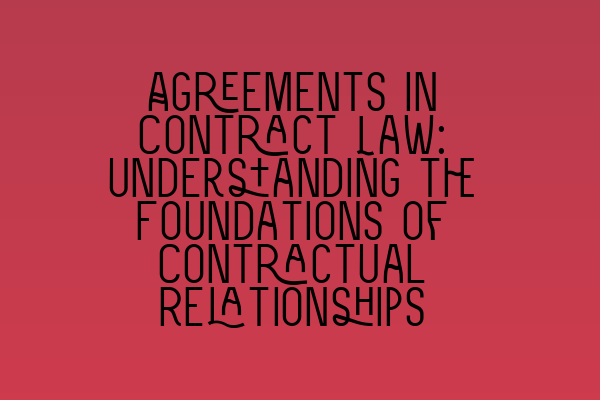Agreements in Contract Law: Understanding the Foundations of Contractual Relationships
Welcome to SQE Contract Law, where we provide expert legal advice and guidance on all aspects of contract law. In this blog post, we will explore the foundations of contractual relationships by understanding the key principles of agreements in contract law.
What is an Agreement?
In contract law, an agreement is the coming together of two or more parties with a mutual understanding to create legal obligations. It is the essential element of a contract and forms the basis of any contractual relationship. An agreement can be made orally or in writing, and it must have a clear offer and acceptance between the parties.
When parties reach an agreement, they must be of sound mind, have legal capacity, and intend to create legal relations. These elements ensure that the agreement is legally binding and enforceable.
However, not all agreements are legally binding. Agreements made in a social or domestic context, such as between friends or family members, are generally not intended to create legal obligations. On the other hand, agreements made in a commercial or business context are presumed to have legal consequences unless stated otherwise.
Elements of an Agreement
An agreement consists of four essential elements: offer, acceptance, consideration, and intention to create legal relations.
- Offer: An offer is a clear and unequivocal expression of willingness to enter into an agreement on specific terms. It must be communicated to the other party and contain certain terms, including the subject matter, price, and any conditions or warranties.
- Acceptance: Acceptance is the unconditional agreement to the terms of the offer. It must be communicated to the offeror and in the prescribed manner, if any. Silence or mere expression of interest is not considered acceptance.
- Consideration: Consideration refers to something of value exchanged between the parties as part of the agreement. It can be in the form of money, goods, or services, and is essential to create a legally binding contract.
- Intention to Create Legal Relations: Both parties must have the intention to create legal relations for the agreement to be enforceable. In commercial agreements, the presumption is that the parties intend to be legally bound. However, this presumption can be rebutted in certain circumstances, such as agreements between family members or friends.
The Importance of Written Agreements
While oral agreements can be legally binding, it is advisable to have written agreements to avoid any misunderstandings or disputes. Written agreements provide clarity and serve as evidence of the terms agreed upon by the parties. They are particularly important in complex transactions or long-term arrangements.
When drafting a written agreement, it is essential to ensure that all material terms are included and that the language used is clear and unambiguous. This helps prevent interpretation issues and ensures that the agreement accurately reflects the parties’ intentions.
Seek Legal Advice from SQE Contract Law
Understanding the foundations of agreements in contract law is crucial for anyone entering into a contractual relationship. If you require expert legal advice or assistance with drafting, reviewing, or interpreting agreements, SQE Contract Law is here to help.
For more information about securing training contracts, please read our related article: Securing Training Contracts: A Roadmap to Becoming a Solicitor.
If you are interested in mentorship opportunities for aspiring solicitors, check out our article: Mentorship for Aspiring Solicitors: Nurturing Talent in the Legal Field.
To navigate the complexities of the legal system, read our article on legal challenges and pitfalls: Legal Challenges and Pitfalls: Navigating the Complexities of the Legal System.
If you’re considering pursuing a career in law, learn about the GDL (Graduate Diploma in Law) as a pathway to becoming a solicitor: The GDL (Graduate Diploma in Law): A Pathway to Becoming a Solicitor.
Finally, be sure to read our article on preparing for the solicitor’s journey ahead: Mastering the Solicitor’s Path: Prepare for the Journey Ahead.
Thank you for visiting SQE Contract Law. Contact us today for all your contract law needs!
